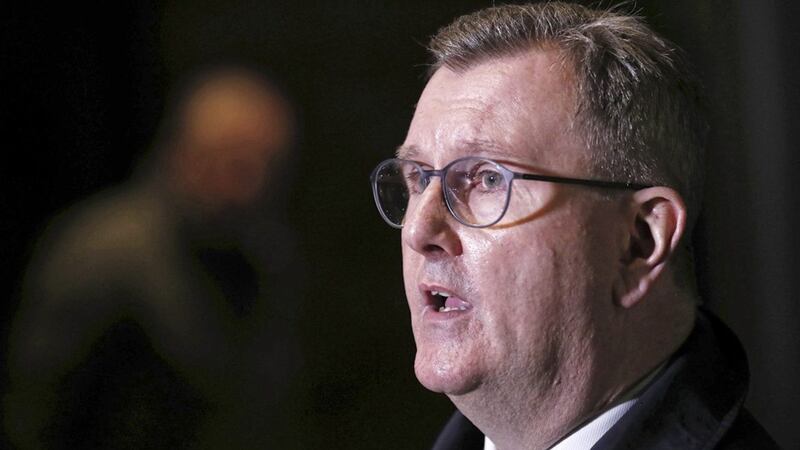Last week, DUP first minister Paul Givan defused speculation of a Stormont collapse by saying the executive should remain in place until the UK-EU protocol meeting on February 21.
Negotiations on the protocol have reportedly been going well and a long-expected stunt to halt sea border checks was apparently proceeding as planned, dominating headlines.
So why did Givan suddenly resign on Thursday? The reasons given by Jeffrey Donaldson do not stack up, except as electioneering. In an “enough is enough” speech, the DUP leader said unionists are tired of Sinn Féin, the SDLP and Alliance demanding “rigorous implementation” of the protocol, yet all three parties resiled from that position long ago. He complained at length about Sinn Féin refusing to fund royal jubilee celebrations or allow a centenary rose bush at Stormont, which sounded embarrassingly petty in this context. Nothing Donaldson claimed unionists have had enough of had changed over the past week.
But something changed the DUP’s calculations in the days before Thursday. The obvious culprit is the escalating internal row over the selection of Edwin Poots for South Down. If so, this fiasco has occurred for arcane party management reasons - like Brexit itself.
**
There is no question the government is legally required to enact the sea border, overriding Stormont if necessary. However, it clearly suited ministers to leave the question hanging in the air for a few days while archly expressing hope the protocol negotiations would solve the problem.
This was not about pressurising the EU, which was distinctly unimpressed. It was about helping the DUP pretend to be influencing negotiations, in order to sell a deal to unionist voters.
A cunning and even choreographed plan, perhaps. Yet it raised hardline unionist expectations, increased tensions in general and soured a mood that had improved in negotiations. Then the collapse of Stormont ruined the choreography anyway. Saving the DUP’s face is harming the prospects of the deal it so desperately needs.
**
The collapse of a coalition government is normal in a healthy democracy - it could happen in the Republic tomorrow. We are about to go to the polls, which is how collapses are normally resolved.
There will be six months after the election to form an executive, thanks to new rules agreed in New Decade, New Approach. The DUP may well exploit this to drag out a crisis. However, taking months to form a coalition - and failing - is also normal in a healthy democracy. In the event of failure, the new rules require another prompt election.
Much of the hand-wringing over Stormont’s dysfunction boils down to the particular requirement for the largest parties of the two largest designations to be in office. That is not a difficult piece of ugly scaffolding to adjust, while still preserving power-sharing. For example, it could be mandatory for those two parties to be offered a role but not compulsory for them to take it.
**
South Down MLA Jim Wells says he will struggle to pay his wife’s care home bills if he loses his South Down seat following his deselection by the DUP. Those bills have been reported at over £3,000 per month, consuming all his £50,000 Stormont salary.
Many people will be familiar with this dreadful position but Wells is more fortunate than most. When he told Radio Ulster he would have to sell his house he was asked “which house” - the register of members’ interests shows he owns three rental properties and his wife owns a fourth.
Wells also told Radio Ulster he has only saved a “small pension”. If he has a small private pension, his Stormont pension should compensate. Having been an assembly member for 24 years, his annual pension entitlement is £30,000. As he is aged 64, the scheme allows him to start claiming the full amount immediately.
**
On the assembly’s new climate change bill, we must consider the terrible possibility that Edwin Poots is right. The DUP minister had wanted an 82 per cent greenhouse gas reduction target by 2050, less than the rest of the UK, due to expert recommendations that our larger agriculture sector makes a lower target proportionate and deliverable.
By moving the target to 100 per cent, the assembly has engaged in unrealistic grandstanding, damaged the bill’s credibility and made it more likely nothing will be done.
However, it is hard to take this lecture from the Ulster Farmers Union, which lobbied against the higher target. Agriculture is effectively a nationalised industry with farmers receiving nine-tenths of their income as a direct grant. They have every right to lobby and be heard. But in the end, he who pays the piper should call the tune.
**
Richard Kay, editor at large of the Daily Mail, visited Belfast for background on Kenneth Branagh’s new film. Despite having lived in the city himself for three years as a reporter during the Troubles, the graffiti appeared to confuse him.
“‘KAH’ is plastered over the wall on the Catholic side of Alexandra Park,” he explained to Daily Mail readers. “It stands for ‘Kill all Hanoverians’: that is, royalists or, in other words, Loyalists.”
Kay did not report seeing any walls marked ‘FTP’, which of course stands for ‘Free the Plantagenets’.









